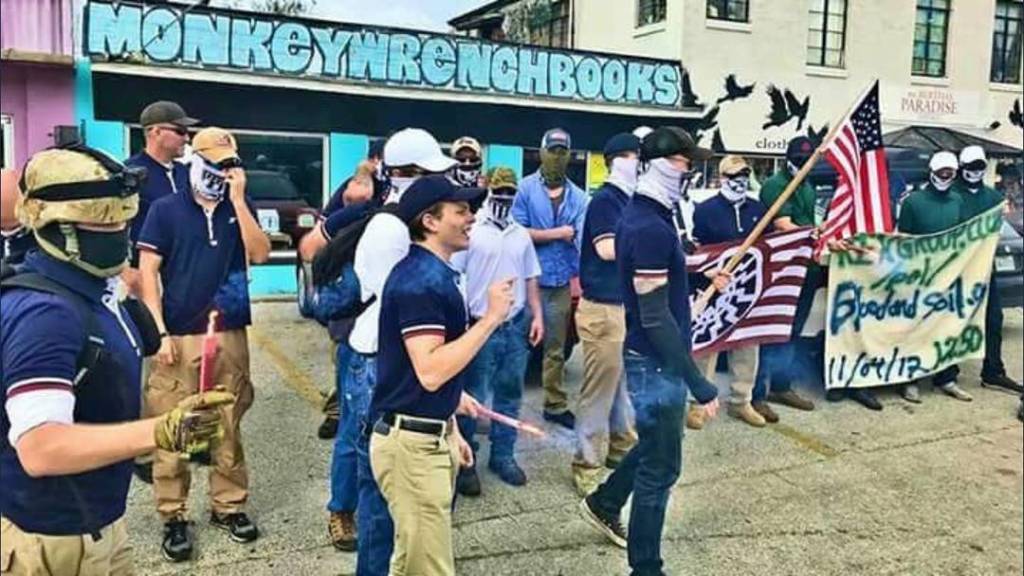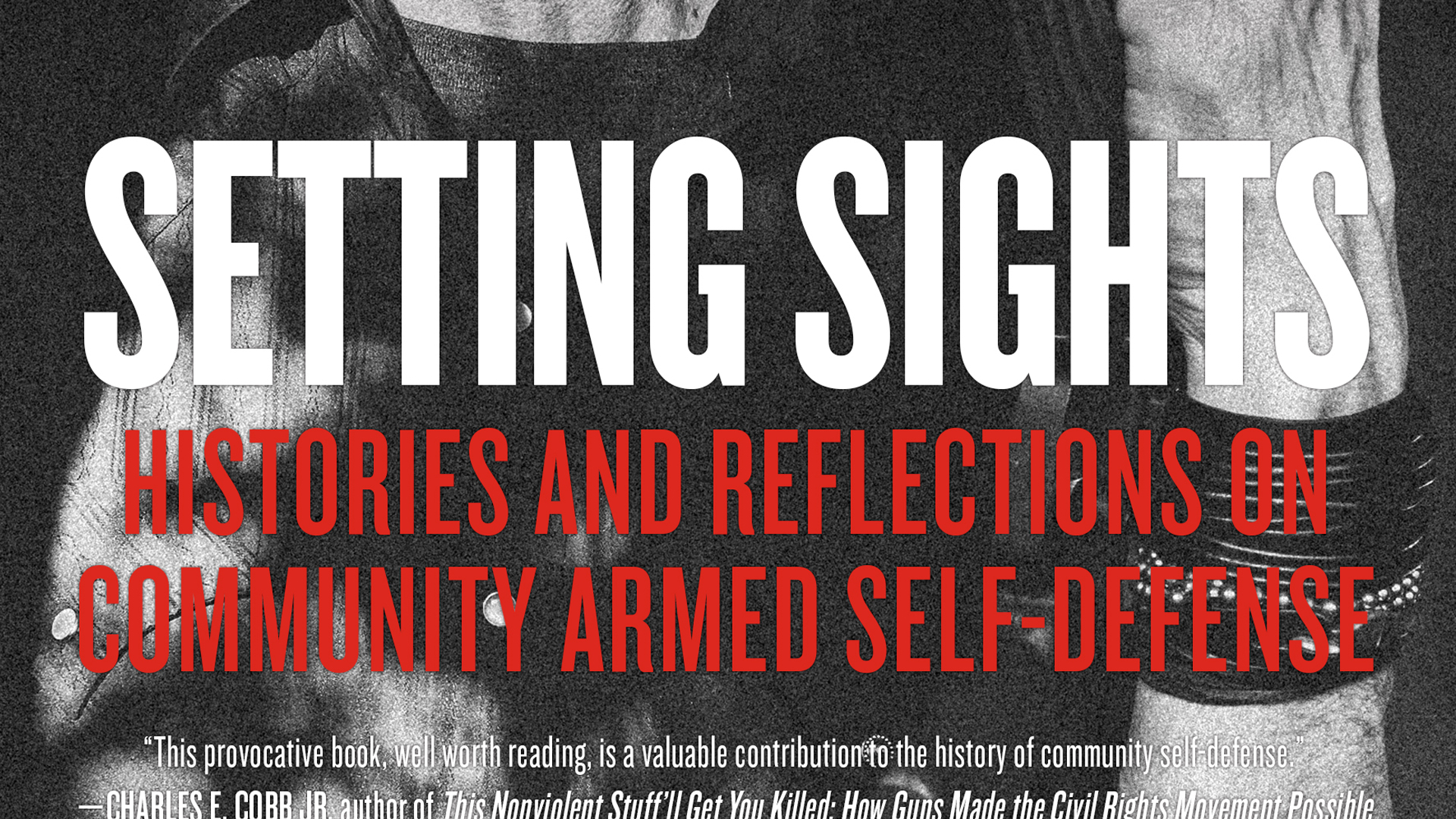By Kit O’Connell
February 1st, 2018

An activist holds an “Antifa” flag above a crowd of marchers. Berlin, June 27, 2009. (Flickr / Sam Chills, CC NC ND license)
“I’m not into the politics of reaction,” scott crow said.
“You need dual power. You must resist on one hand, but you have to build and create on the other hand.”
In December, I caught up with anarchist organizer and author scott crow when he stopped by my house to drop off some copies of his book “Emergency Hearts, Molotov Dreams,” which I gave away to my Patreon patrons. I took the opportunity to talk with crow about American politics and antifa after a year of the Trump regime. In the previous part of this interview, I got crow’s thoughts on the media, so in this part I’ll focus on our conversation about everyday antifascism and the limitations of antifascist tactics.
The historic rise of American antifascism
Though he describes himself as retired from it now, crow spent years engaged in antifascism and antiracist activism. His work as a founding member of the Common Ground Collective grew out of his armed resistance to racist mobs that were threatening people of color in New Orleans’ poorest neighborhoods in the immediate aftermath of Hurricane Katrina.
However, many of the groups he worked with in the past avoided words like “antifa,” which were already in widespread use in Europe but unfamiliar stateside. The speed with which these concepts and tactics have entered American culture after the last election is quite remarkable.
“The rise of antifascism in the way we have seen is something that is pretty historic in the United States,” crow said. He also cited the “militancy” of modern activists, an increasing number of whom seem willing to shut down white supremacy, extractive capitalism and other harmful forces through the use of confrontational tactics.
“I’m not saying that people haven’t been militant but it’s much broader now.”
Where fascism was once something of a foreign concept to Americans, it’s now a concept that’s helped reframe major aspects of left activism:
Antifascism has really just become the the broader rubric that we’re all engaged in, what we’re all doing. You could call it antimperialism, antiglobalization, antineoliberalism, these are all the different facets of it that have come before. It’s the latest reiteration of the last 20 years or so.
‘That’s everyday antifascism’

In addition to abruptly becoming culturally relevant, antifascists won measurable victories in 2017, driving nazis off the streets and making large scale, Charlottesville-style fascist rallies largely untenable. “Antifascist ideas took root really fast. People put the tactics into play, put the actions into play very quickly over the last year and a half and I think that’s really important.”
crow continued:
And it also created a space where those who would not engage in those ideas were able to see some validity in it, which we’ve never gotten before. So even people who were straight-ticket Democrats in electoral politics, even if they disagree with fighting in the streets they were able to go, “you’ve given us space to go oh my gosh we need to fight fascists on these other fronts,” whether that’s the choice of access to abortion, immigration, the nationalism that’s happening right now. They are able to fight it in their own way, again, given this sort of permission because kids are willing to fight in the streets.
As one example we discussed, when nazis from the group “Patriot Front” mobilized in front of the local anarchist bookstore, Monkeywrench Books, the shopkeepers of other local stores and people shopping in the area confronted the white supremacists, a sign that normal people feel empowered and recognize the importance of acting.
“That’s everyday antifascism, when all the other people come out to say ‘fuck you, get the fuck out of here.’”
However, the White Supremacist In Chief and all those he’s put in power remain in power.

You can’t build movements on antifascism
“A reporter asked me the other day — they’re like can you build movements on antifascism? I said no, because it’s a reactive set of ideas, and strategies and tactics that are really good for this very limited thing, which is confrontation and bringing witness, if you want to use that term, to egregious exclusion — neo-nazis and fascists of all forms.”
Rather than a movement in its own right, antifascism is a tactic, a reaction to the presence of a specific danger to our communities and their most vulnerable members. “There are limits to it because it is a politics of reacting to something that is rising or fear of something that may become bigger.”
crow feels that the left in the U.S. doesn’t spend enough energy trying to build something radically new. “Largely, we’re stuck in the politics of resistance, of trying to stop the bleeding, trying to stop the onslaughts that are happening to immigrants, to women, to undocumented people, to prisoners, to queer people, you can just go down the list right?”
He added:
We do that fairly well. We’re great fire brigades. But I think if we really want to stop this stuff, we need to begin to think about what is it, how is it we want to build our power.
How do we want to build autonomy? How do we want to build resilience, not just for myself or my group or my campaign, but larger than that? In my neighborhood, in my community, in my overlapping communities that I’m in, and then in the cities where we live, because we still live in cities right now.
In the final part of this interview, we talked about what it could we might be able to build under the disaster that is President Trump as well as crow’s newest book, “Setting Sights: Histories & Reflections on Armed Self-Defense.”
While supplies last, new Gonzo Insiders get a copy of scott crow’s “Emergency Hearts, Molotov Dreams” and some other fun goodies. Just donate $10 or more to be eligible.
Everyday Antifascism & The Limits Of Antifa: scott crow On Movement Building Under Trump by Kit O’Connell is licensed under a Creative Commons Attribution 4.0 International License.
Based on a work at https://kitoconnell.com/2018/01/31/everyday-antifascism/.







